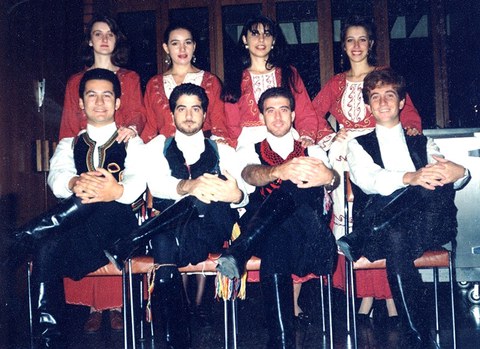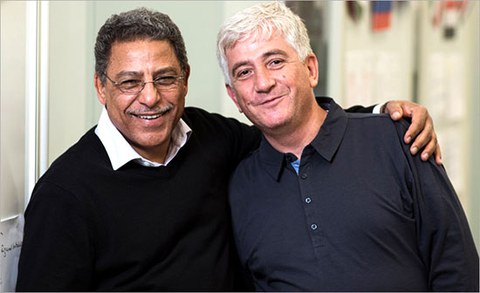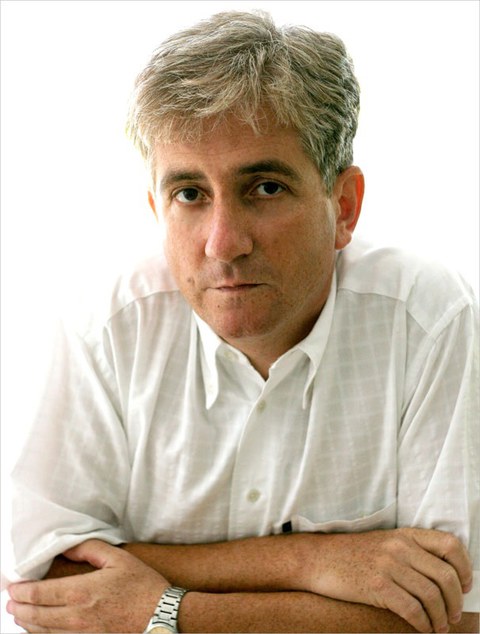A political scientist as mediator between North, South, East and West
(Interview from 2017)
Thomas Scheufler
Five continents – six regional ambassadors: Tasos Costeas would like to give interested students all the information they need for a stay abroad, because Cyprus as an island state is a crossroads between East and West.
First name: Tasos
Surname: Costeas
Graduating year: 1998
Degree program: Political Science and History
Current role: Employee at the Office of the Ombudsman of Cyprus
Regional ambassador: Since 2011
Are you planning a stay in Cyprus? Then contact Tasos Costeas.
KONTAKT online spoke to him about upheavals, broaching complex subjects, and slips of the tongue
What did you study at TUD? Why did you decide to study at TU Dresden?
The early 1990s were a period of political upheaval. Germany and Europe were changing rapidly and dramatically, and East Germany was the epicenter of that change. I became fascinated with Dresden after visiting my brother, who was studying musical composition there at the time. In my opinion, Dresden was and remains one of the best places to study – not only in Europe, but in the world. And so I decided to study there.
Would you tell us an anecdote from your student days? What are your happiest memories? Where did you like to go in Dresden? What was your favorite place at university?
Like any student, and particularly as a foreigner, I could tell countless stories about student life. For me, my first presentation in my first semester in international relations was unforgettable – and embarrassing. I was still fighting with the language barrier, so I chose a subject that was easy for me and nothing if not topical: the Cyprus issue! Amongst other things, I talked about the Cypriot flag – which, by the way, was drawn by a Turkish teacher in 1960. That evening, I was planning to buy a new frying pan. The similarity of the words [flag = "Fahne" and pan = "Pfanne" in German] meant that the short talk became a personal challenge to remember the difference between "flag" and "pan" (although "Pfanne" actually comes from the Greek). Fortunately, Prof. Büren politely corrected me before the laughter of my fellow students became too embarrassing. My favorite places at the university were the nice cafeteria in the new canteen building, the old library of the Faculty of Arts, Humanities and Social Science on the third floor of the August-Bebel-Straße building, and the old computer science center on Gerokstraße, where we got to experience the early days of the Internet.

International evening in 1994 in the "Neue Mensa" canteen, with the Cypriot dance ensemble
What are your links to TUD today? How do you use your TUD ties in your professional and personal network?
Although life constantly throws new challenges at you and new things take priority, you don't just forget good memories and old friendships. TU Dresden is still an inexhaustible source of experience and education for me; it regularly provides me with new insights and developments for my working life.
Why did you become a TUD regional ambassador? Why is the role important to you?
I believe it is important to help young people recognize how important studying abroad can be. My work goes in both directions – from Dresden to Cyprus and from Cyprus to Dresden. Particularly for young people in my home country of Cyprus, which, like Malta, is a small (island) world in itself within Europe, just "going away for a while" is a big step. Small countries often lack "international socialization," regardless of living standards and despite the Internet. The challenges we face today and for which we urgently seek solutions are so complex that it is almost impossible to tackle them alone. International cooperation, intercultural exchange, and multilingualism build the most important framework for all action. There is no lack of openness or acceptance in Germany today – and I am sure that this will continue to be the case in the future, despite some differences of perspective. TU Dresden is a good example of that openness, and I feel that my role as a regional ambassador is like a wide-open window to Germany.

At the 2016 alumni week with US regional ambassador Osman Hamdan
How can you help researchers, students, and alumni of TUD who are interested in studying in your country? What have you already achieved in practical terms?
I am always ready to give interested students all the information they need to study abroad. As an island nation, Cyprus is a crossroads between East and West, and subjects such as economics, finance, and seafaring, as well as politics, history, and culture, are particularly relevant. We regularly receive inquiries both in my capacity as regional ambassador and through the Zyprisch-Deutscher Kulturverein [Cypriot-German cultural association], which my colleagues and I readily answer.
Have you had the opportunity to promote TUD within your networks?
Interest in studying in Germany has increased – but the UK and Greece remain the most popular destinations. Cypriot students are concerned about learning German. However, since TUD has started offering more and more English-language courses, that has changed. When I came to Dresden in October 2016 for the International Alumni Week organized by the TUD Alumni Relations Office, I met a number of Cypriot students. That is a good sign.
What else have you done along these lines?
Dresden is a well-known German city, but it does not have the same international profile as Berlin, Munich, Frankfurt, or Hamburg. However, Dresden features in the headlines at least once a year: on the first Sunday in Advent each year, when there are television reports on the cutting of the giant Christmas Stollen at the Striezelmarkt. But Dresden has so much more to offer than Christmas tourism and – sadly – Pegida.
What are your ideas and plans for the future as a regional ambassador? What suggestions, tips, and requests would you like to pass on to the Alumni Relations Office?
There are always more ideas than time and resources. Yet ideas are important because they also allow you to set easily achievable goals. For November of next year, when Cyprus hosts annual events as part of "German Language Month," we hope to organize something bigger with TUD – perhaps a research exhibition.
Update 2022
After graduating, Tasos Costeas worked as a journalist for various printed media companies and as a press officer at non-profit organizations. As an amateur photographer, he has taken part in photography exhibitions in Cyprus, Athens, Brussels and Paris. Since 2001, he has been employed at the Office of the Ombudsman of the Republic of Cyprus. As a passionate political scientist, he is involved in a movement that promotes bringing Greek and Turkish Cypriots together, including the organization of events to promote a common understanding and peaceful coexistence of both communities of peoples in Cyprus. In January 2022, Tasos Costeas was appointed Chairman of the Cyprus Peace Council.
Tasos Costeas
Country: Cyprus
Town/city: Larnaca

